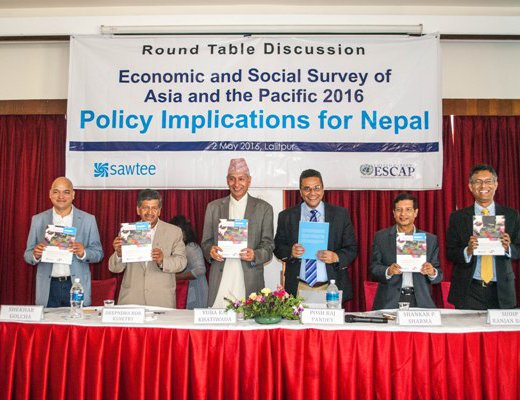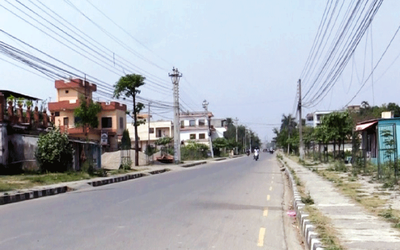
Although Nepal promulgated the new constitution ending the political debate, Nepal’s economic growth rate continues to receive setback. Given the earthquake and political unrest in the southern border, Nepal’s economic recovery has a long way to go.
“Economic growth in Nepal fell from 5.4% in 2014 to 3.4% in 2015. Catastrophic earthquakes in April 2015, causing losses estimated at one third of GDP, and a subpar monsoon season that resulted in weak agricultural output mainly accounted for the slowdown,” said UNESCAP report.
Continued political unrest over the new constitution resulted in strikes and disruptions of traderoutes in certain parts of the country. The unrest pushed up prices of fuel and other essentialcommodities and widened the difference in inflation rates between Nepal and India, a situationwhich could undermine the country’s competitiveness in view of the exchange rate peg to theIndian rupee.
Growth in output is expected to soften further to 2.2% in 2016, before rebounding to 4.5% in 2017. Consumer spending may be constrained by relatively high inflation and weak agricultural production.
In the medium term, a trade agreement with the United States, which grants duty-free treatmentto certain textile and apparel articles from Nepal, should help to attract greater investment flows.
Similarly, an agreement with India to develop two large-scale hydropower
Projects could help exploit Nepal’s immense hydropower potential and address
The issue of power shortages.
To strengthen the role of fiscal policy in supporting social and economic development, there is aneed to address the persistent under-disbursement of allocated budgets, which is mainly due topoor project management and bureaucratic hurdles.
Similarly, tax administration andcompliance could be improved. In this regard, the Government announced the issuance of areconstruction bond to enhance the ownership and participation of the general public in the reconstruction works.
Official estimate suggests that the April 2015 earthquake may have pushed at least 700,000 more people into poverty in 2016, undermining the country’s target of reducing the poverty rate to 18% by 2016 from 25% in 2011.
Organized by South Asia Watch on Trade, Economics and Environment (SAWTEE) and United Nations Economic and Social Commission for Asia and the Pacific (UNESCAP), Nepalese economist expresses their opinion on Economic and Social Survey of Asia and the Pacific 2016: Policy Implications for Nepal.
The objective of the program is to disseminate the major findings of UNESCAP’s flagship publication: Economic and Social Survey of Asia and the Pacific 2016 which focuses on “Nurturing productivity for inclusive growth and sustainable development”.
The annual flagship publication of the UNESCAP ‘Economic and Social Survey of Asia and The Pacific 2016’focuses on nurturing productivity for inclusive growth and sustainable development.
Dr. Sudip Ranjan Basu, Economic Affairs Officer, UNESCAP highlighted the fact thatthere has been slow down of productivity gains in recent years; and amid the weakening of decent employment, reduction of poverty and inequality have emerged as key challenges in the Asian economies.
He added that productivity and Sustainable Development Goals (SDGs) are closelyinterlinked and we need growth with increase in productivity to achieve the targets set by the SDGs.
Speaking at the program, Deependra Bahadur Kshetry, Former Vice Chairman at the National Planning Commission, Nepal and Former Governor, Nepal Rastra Bank, said that poverty alleviation is the primary objective of the upcoming SDGs.
However, he stressed that our policymakers should be mindful of the fact that in this era of globalization economic outcomes of our economic partners are more likely to have cascading effects on Nepal’s own economy.
Dr. Shankar P.Sharma, Former Vice Chairman at the National Planning Commission, Nepal saidthat lack of technical skills in the labor force and absence of integration with regional and global value chains have negatively affected the country’s labor productivity and job market. Therefore, we need to have a positive transformational growth focusing on high employment and high productivity sectors.
Shekhar Golchha, Vice President, Federation of Nepalese Chamber of Commerce (FNCCI) highlighted the problems faced by the private sector in the country. He said that the two important sectors for the Nepalese economy i.e. the agriculture sector and the industrial sector have not been able to attain any growth or create employment opportunities in recent years because of poor policies, unsupportive laws and poor infrastructure which has adversely affected the competitiveness of these sectors in the global economy.
The Chief Guest of the program, Dr. Yuba Raj Khatiwada, Vice Chairman of National Planning Commission said that we need to be clear on how to raise productivity of our labor force. For this he said that we need to take forward efficiency and inclusion in an optimum manner, striking a balance between labor productivity and wages.
Chairman of SAWTEE as well as the chair of the program, Dr. Posh Raj Pandey, suggested that it is difficult for a small economy like Nepal to be economically independent. In that case, Nepal should aim to create predictable dependency so we can focus in increasing productivity and efficiency to achieve a sustained economic growth. He also highlighted that Nepal can benefit from the growth in the region and further suggested that focusing on proper implementation of existing regional trade agreements in South Asia, such as the South Asian Free Trade Area (SAFTA) and SAARC Agreement on Trade in Services (SATIS) should be a priority.
- TANAHU HYDROPOWER PROEJCT: A Significant Achievement
- Apr 15, 2024
- AMBASSADOR HANAN GODAR: Sharing Pain With A Nepali Family
- Mar 30, 2024
- VISIT OF KfW AND EIB TO NEPAL : Mission Matters
- Mar 25, 2024
- NEPAL BRITAIN SOCIETY: Pratima Pande's Leadership
- Mar 24, 2024
- NEPAL ARMY DAY: Time To Recall Glory
- Mar 15, 2024
















